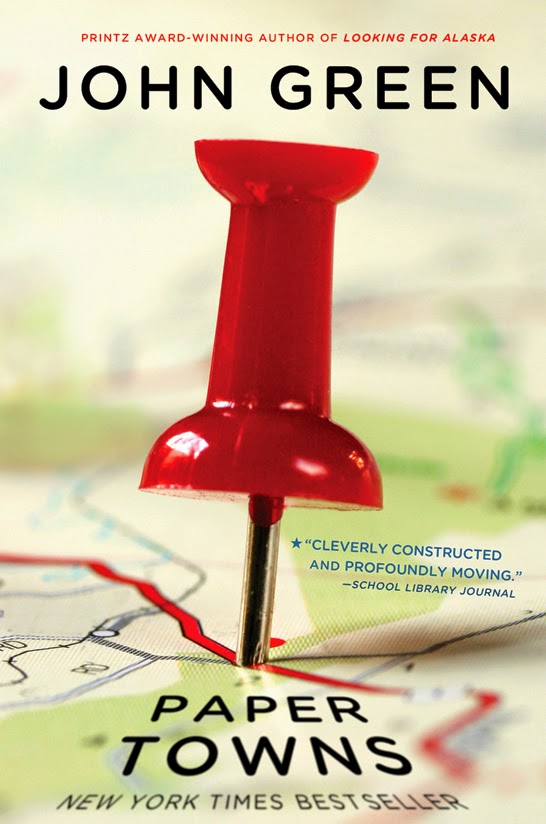power in paper town
A cynic would say that human relationships are about negotiating for power—and a cynic would be right. This jockeying for power plays out in every human relationship, in every sort of way: manipulations, lies, and a thousand other little cruelties.
Nowhere have I seen this more clearly than in my observation of filmmaking relationships.
I write screenplays. Some of them have gotten a little contest attention, and some of them have been produced. They're decent screenplays, and they're getting better. But in Hollywood-power-structure terms, I'm a nobody... and I'm generally treated as such.
A little while back, I got a one-day job as an extra on the set of the movie PAPER TOWNS. I've done a fair bit of extra-ing, so I harbor no illusions that my role as a fuzzy-meat-sack-in-the-background is going to lead to greater things in the world of film. Extras are not really people so much as they are moving props, and are even referred to in faintly-livestock-ish terms. The place where extras wait around is called "extras holding," and the people who manage extras are called "extras handlers."
I went mostly because I knew they'd pay me and the food would be good, and also because I was hoping for a chance to meet the writer whose book the movie was based on, John Green—a seemingly decent chap who as you might know was included in Time magazine's 100-most-influential-people list for 2014. If John Green and I became bosom buddies and he ended up, say, reading one of my books and tweeting about it, I'd probably instantly sell enough copies that I could survive another year or two in this micro-budget writing experiment of mine.
I know where you think this is going, but you're wrong.
John Green was cool. He seemed a bit preoccupied, but was kind enough to shake hands and chat for a bit, before he was pulled away by his ever-ringing phone.
There was this big-kahuna producer, though. And I guess from where I was standing and how I was dressed and the fact that I'd just been chatting it up with John Green, he thought maybe I might be somebody. He came over. He said hello and that he hadn't seen me on set before and how was I doing?
I knew immediately that he was trying to lock down just one, essential question: Did I matter?
I could've strung him along a little, but that seemed both disingenuous and ultimately-doomed, so I told him the truth—that I was only there because I had a crappy car that at some point I supposed I'd be driving along a road in the background.
His eyes glazed over. He nodded, and left. A few moments later my (slightly controlling) handler came and told me I needed to stand over next to my car, in case I was needed.*
This isn't some indictment of that producer. He does good work, and in that moment he needed to be focused on his job—not chatting it up with the moving props. With seven billion people in the world, we cannot give more than a few of them our undivided attention. Most will, by necessity, be treated as film extras—relegated to the position of "fuzzy meat-sack." And even I, supremely enlightened dude that I am, was largely wanting to meet John Green because of his position of power.
In one sense, this is just the way things are.
If we stopped there, however, we'd be in deep doo-doo.
Because we don't actually have to do this. If we're willing to talk less and listen more, we can be more open to the possibility that whatever person we're talking to might have something to say that could really enrich our lives or—GASP—we might have something to offer to them.
That last bit is the core of what I'm trying to say. That if we view our relationships as all about ourselves, then I think we'll always revert to the cynic's power-struggles. If we're dating, for example, we might perpetually spend all our time evaluating our dates on the basis of their potential as mates/sexual partners for ourselves. Or later, after the wedding bells, we might just spend all our time bellyaching about the ways in which our partner isn't quite measuring up... isn't making us look good in front of our peers... isn't increasing our feeling of power-in-the-world.
That jockeying for power comes from fear, I think. It comes from a deep-down emotional understanding of our own mortality and finitude.
Mortality and finitude are real, and they deserve our attention.
There is another way, though, when it comes to relationships.
We can allow the cynicism and fear that drive us into grasping after power to be modified, ameliorated, and even overcome by the insanity that is love. I'm talking real love, here—not the kind that's sugar-coated and bent to the purposes of power. I'm talking a kind of love that focuses on giving, rather than getting. A kind of love that sacrifices my immediate urges in the faith-driven hope that that sacrifice will not come back void—that love does, indeed win.
- - -
*These two events—him dismissing me and her telling me to get back with the peons—were probably connected... but maybe not. And by the way, I wasn't ever needed. I spent eight hours on that set just sitting around absolutely gorging myself on Craft Services, and then went home. C'est la vie.
FINAL NOTE: Paper towns are places that are only towns on paper. They're invented by mapmakers as a way of proving that other mapmakers have plagiarized their work. If you look at the map, they seem real. But they're often nothing more than a gas station, or a fantasy.






Comments
Post a Comment